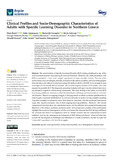| dc.description.abstract | The manifestation of Specific Learning Disorder (SLD) during adulthood is one of the least examined research areas among the relevant literature. Therefore, the adult population with SLD is considered a "rare" and "unique" population of major scientific interest. The aim of the current study was to investigate, describe, and analyze the clinical, academic, and socio-demographic characteristics, and other everyday functioning life-skills of adults with SLD, in an attempt to shed more light on this limited field of research. The overall sample consisted of 318 adults, who were assessed for possible SLD. The diagnostic procedure included self-report records (clinical interview), psychometric/cognitive, and learning assessments. The main finding of the study was that SLD, even during adulthood, continues to affect the individuals' well-being and functionality in all of their life domains. There is an ongoing struggle of this population to obtain academic qualifications in order to gain vocational rehabilitation, as well as a difficulty to create a family, possibly resulting from their unstable occupational status, their financial insecurity, and the emotional/self-esteem issues they usually encounter, due to their ongoing learning problems. Moreover, the various interpersonal characteristics, the comorbidity issues, and the different developmental backgrounds observed in the clinical, academic, personal, social, and occupational profiles of the participants, highlight the enormous heterogeneity and the continuum that characterizes SLD during adulthood. We conclude that there is an imperative need for further research and the construction of more sufficient tools for the assessment and diagnosis of SLD during adulthood, which will take into account the developmental challenges and milestones in a series of domains, in order to assist this "vulnerable" population with their life struggles. | en_UK |


